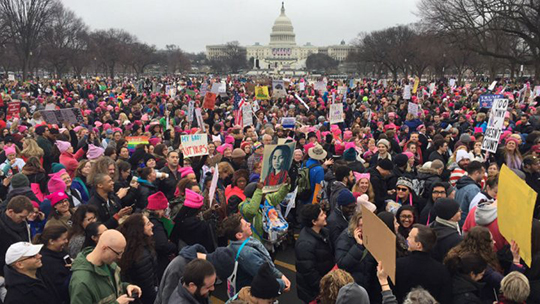Washington, Jan 22: More than a million Americans have taken to the streets from New York to Los Angeles to participate in a women's march in an unprecedented rebuke of President Donald Trump's alleged divisive policies and anti-women views.

The protest came a day after Trump was sworn in as the 45th President of the United States.
"This is more than just a single day of action, this is the beginning of a movement to protect, defend and advance human rights, even in the face of adversity," declared organisers of the Women's March at the conclusion of the successful protest.
Participants of the Women's March said they have joined this because of the alleged divisive policies of the new American president.
Five Indian-Americans elected to the Congress enthusiastically joined the march.
In Washington DC, organisers said some half a million people participated in the march, while crowd swelled more than this in Los Angeles.
In Washington protesters filled Pennsylvania Avenue. In the evening, the crowd moved toward the White House.
Filmmaker Michael Moore, feminist icon Gloria Steinem, musician Alicia Keys and other speakers emotionally attacked Trump for his views on immigration, Muslims and women.
Metro trains were packed with pink "pussyhat" wearing protesters — a reference to Trump's claim in a 2005 video that he grabbed women.
Pop diva Madonna, wearing a black pussyhat, made an impromptu appearance on the protest's main stage near Washington's National Mall.
"It took this horrific moment of darkness to wake us the f--k up," Madonna told the crowd. "It seems as though we had all slipped into a false sense of comfort, that justice would prevail and that good would win in the end."
In a sly allusion to the crude remarks Trump made on the tape, many marchers, women and men alike, wore pink “pussy hats” sporting cat ears.
Demonstrators in New York City marched toward Trump Tower -- the President's main residence when he's not in the White House -- but were blocked at Fifth Avenue.
In Chicago some 150,000 people attended, while in Boston tens of thousands of marchers joined the protest which among others was addressed by Senator Elizabeth Warren.
"We can whimper. We can whine. Or we can fight back!. We come here to stand shoulder to shoulder to make clear: We are here! We will not be silent! We will not play dead! We will fight for what we believe in!" Warren said.
"This is a do or die battle for us. We need to fight against the onslaught on our human rights," said Monika, a small time documentary maker from New York, who came to Washington DC to attend the women's march.
Yesterday, former Secretary of State and Democratic presidential nominee Hillary Clinton came out in support of the march.
"Thanks for standing, speaking & marching for our values @womensmarch. Important as ever. I truly believe we're always Stronger Together," she said in a tweet.





Comments
Add new comment